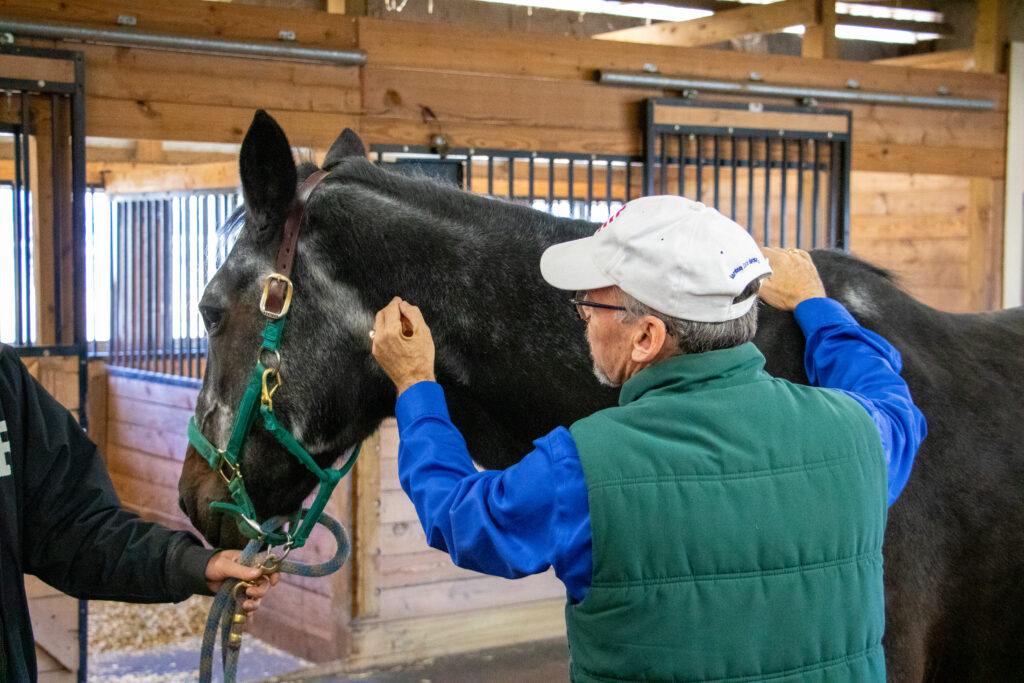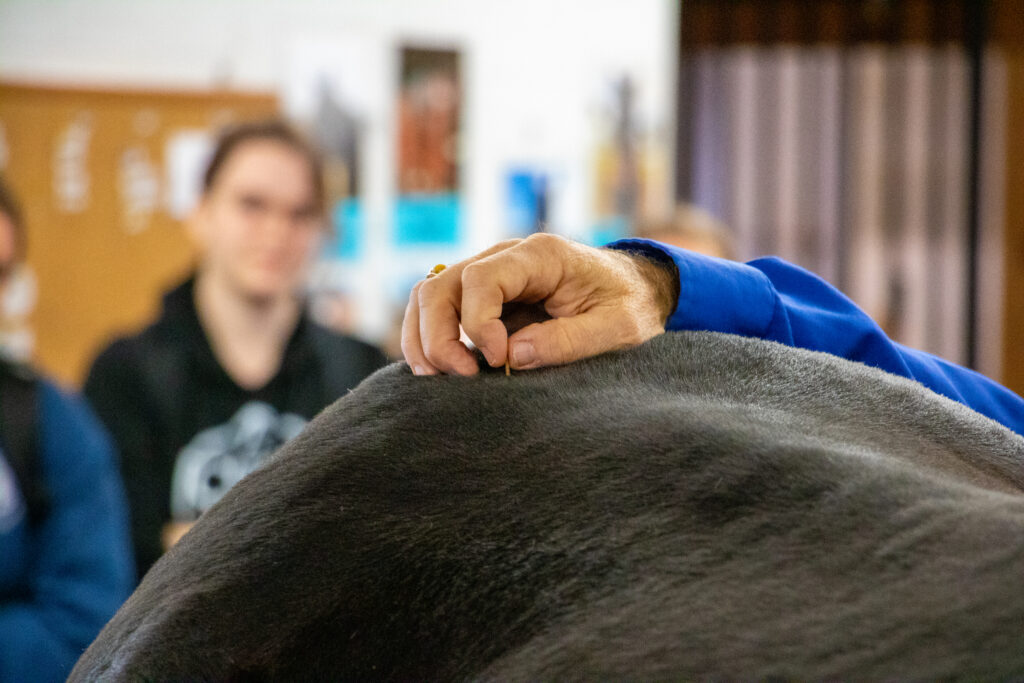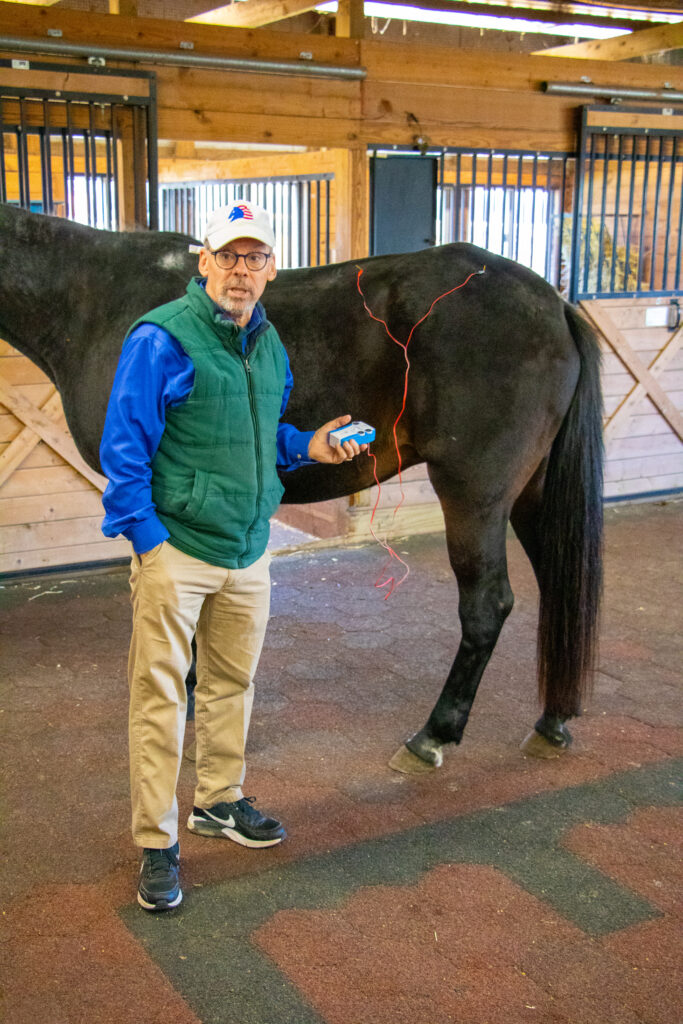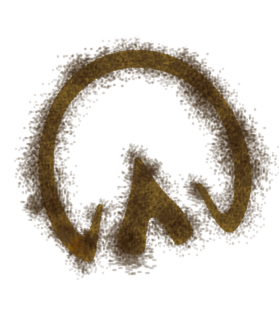Career: Acupuncture
Hay Everyone!
I am back once again with the latest installment in my series on careers in the equine industry. Today you’ll get to meet Dr. Brian Colquhoun, a veterinarian trained in acupuncture. He owns and operates Colquhoun Equine Health & Performance, a veterinary practice located in New Jersey. We are very lucky here at Rutgers University because Dr. Colquhoun visits campus on a routine basis to share his expertise with undergraduate students in our classes. Enjoy this brief glimpse into Dr. Colquhoun’s career!
Lord Nelson: What does a typical day at work look like for you?
Dr. Colquhoun: There really is no such thing as a typical day. That’s one of the great things about this job. You’re not going to get up every single day and do the same thing. There are some days when I’m running like crazy. Unfortunately, we live in New Jersey, so I have to deal with New Jersey traffic. In the fall and spring, I may be going out to do my routine exams and vaccines on a whole barn of horses. Then we may have something like a lameness exam to do. There’s always the possibility that something will come up in the course of the day that you didn’t expect. You might have to change on the fly to take care of that as well. One thing you can be sure of, it’s always going to be different and always going to be exciting and you’re not going to be bored.
LN: What’s your favorite part of your job?
Dr. C: That’s an interesting question. I’ll just tell you what I like doing with my job. Usually, the weather is part of it. Much of the time it’s in the 60s or 70s and I’m going out to the farms and I’m doing my routine work. I’m getting to visit with everyone. I’m getting to see all the horses and I really do enjoy that. I enjoy spending time around the horses, which is why I do it in the first place. That to me is one of the most beneficial parts of it.
I love to go out for a call with say a lame horse. And I know it’s going to take me a fair amount of time to work it out. You go out and you spend your time with the horse. Hopefully by the time that’s done, you’ve figured the problem out and now you know how you can help it. That’s super rewarding. Those are the kinds of things I like and why I like this job.

Examining a horse for sensitive points.
LN: On the flip side of that, what’s your least favorite part of this job?
Dr. C: The middle of winter with a colicky horse! The first thing I have to do is take all my outer garments off, so I can do the exams and stuff. That’s not very fun in the middle of winter. I also dislike the ones where the horses aren’t doing well, and I get to the point where I know there’s nothing else I can do for it. I have to be able to do what is in its best interest and that’s okay with me. I don’t get depressed because I have to, for instance, euthanize a horse that has a problem. It’s still hard, though. Helping the horse is obviously why we do this. So, my least favorite part is to run into an animal that’s in a great deal of distress and to know that I can’t do anything.
LN: What interested you in acupuncture and how did you get involved in that?
Dr. C: This is a great story because I was still in school. It was between my first and second year of vet school. I was working at a big practice in Pennsylvania with a lot of fancy horses and high level stuff. They had a couple vets there that had been shown some acupuncture techniques. I won’t say they really knew acupuncture, but we weren’t far from the University of Pennsylvania and so, they had a relationship with the university and learned from them. I saw over the course of that summer that the horses were actually improving, and the trainers and the riders were very pleased with what they saw. I was kind of intrigued by that.
Well, I went back to work at that same practice the following summer. I saw more of that, and I thought, “Wow, you know, there’s something to this”. We don’t really know much about it and how it works. Then when I was a senior in vet school and we were on clinics, I had a horse that I thought would benefit from acupuncture. I debated with myself on whether I should bring that up in the university setting. I finally decided to go ahead. The head of medicine was there, and he said, “What do you think?”. I replied, “I think this horse could benefit from acupuncture”. He agreed and told me “I have a colleague here who does acupuncture. I’ll bring him out and you guys can work on it.” I was floored because I thought I was going to get reamed out for suggesting acupuncture. It turns out he was a very forward thinking practitioner. And lo and behold, I got my own little private acupuncture teaching session.
From the time I got out of school, I knew acupuncture would be a part of my work. I just started doing it and it took me a little while to get certified. I was doing a very rudimentary form of it to begin with. Then I went through and got certified and then became involved in teaching and in the organizational stuff. It is something that sits well with me and appeals to me. I’ve had great success with it over the years.
LN: What made you want to be a veterinarian in the first place?
Dr. C: My family got involved in horses when I was about eight years old. I was one of seven children and the only one who liked science in school. I liked to hang around when the vet came and I kind of enjoyed that. I knew I wasn’t going be a Grand Prix jumper rider. Not that I didn’t want to be, I just knew I didn’t have it. I also knew I wanted to keep horses as part of my life. I was going to be a lawyer because everyone in the family was going to be a lawyer. This way I could pay for my horses! I was between my junior and senior year in high school and my father said to me, “I think maybe you would be interested in a different career, and he suggested human orthopedic surgery.” I said, “Well, okay, I’ll think about it.” I came back and told him I wanted to be a vet.
That love of horses and science is why I got into it. I do it for the reason anybody does anything with horses. You do it for the love of the animal, ultimately and to try to make things as best for these animals as we can. And so that’s what I think it’s all about. It’s all about helping to keep these great creatures as happy and healthy as we can.

Performing acupuncture as students watch.
LN: Coming out of vet school, how did you establish yourself as a practitioner and make yourself successful?
Dr. C: I guess to begin with I was kind of winging it. My first job was on the track. Like a lot of vets, I quickly tired of that. I had come from a hunter jumper show background and that’s really where my interests lay. I got involved in more of the farm practice and trying to develop the horse show and pleasure side of things. I came back to New Jersey and took a job for two or three years learning the ropes. I got to a point where I had to decide if I was going to renew my contract or do something else. The practice I was with was okay, but I wasn’t practicing like I really wanted to.
Remember, I had worked at that big fancy practice in Pennsylvania, so I decided to go ahead and give my own practice a shot. I had nothing. I just put my shingle out and drove around to farms saying I’m available as a veterinarian. Eventually, somebody had me look at a horse and then another one. That was 1994, so I’ve had almost 30 years in my own practice.
It has its ups, and it has its downs. There has been more than one time during the course of that time when, due to economic conditions, the bottom dropped out. I kept at it and worked the practice back up. It’s just business.
LN: If someone were considering a similar career path, what advice would you offer to them?
Dr. C: I think the first thing is to be really, really, really sure that this is the life they want to live. This is not a job; this is the way you live. I hate to say this, but veterinarians as you may know, have the highest incidence of alcoholism, drug abuse, divorce, and suicide in the health professions. Horse practitioners are represented in that group. You really have to be sure that it’s something that you’re committed to. I know that it is popular nowadays to try to have a life aside from your career. I think that’s where a lot of that discontent maybe comes from because it is very difficult to do.
This type of career takes a very good support group as well. Everybody has to be on the same page. I’m going to be honest. It’s a great profession. It’s wonderful what you can do, but it certainly is not for everyone. You have to be sure this is what you want.

Using electrostimulation during an acupuncture treatment.
LN: What’s a good way for them to figure out if they really want this career?
Dr. C: I think getting as much exposure as they can give themselves is great. Even as I was thinking about becoming a veterinarian, I had vets trying to talk me out of it all the time. I rode with lots of different vets before I ever got to vet school. And that’s what you have to do, expose yourself to it as much as possible. Don’t be afraid to talk about those difficult things. Not everything is rosy and good, and you need to understand what the dark side of any profession is before you get into it.
Dealing with some of the more difficult things such as the trainers and the riders and the horses, that’s part of it. And if you’re not okay with that, then don’t do it. I won’t work on the racetrack because for me it’s too unethical. I have practitioner friends, good friends who don’t agree with that, and they’re perfectly fine working on the racetrack. They go about their business, and they love it. It just depends on where you’re coming from as an individual. You have to consider all these things.
A lot of the times when we’re just riding along with a vet for a few hours. We go home and think “Wow. That was great.” But you have to take everything into consideration. I hate to be a downer, but I do think that it takes consideration and exposure to decide if this is the right fit for you.
Right now, we’re having a crisis in the veterinary community. We can’t get people to be horse vets for some of the very reasons that we’re discussing here today. They’re trying to come up with ideas of how we can encourage people to become horse vets. Whereas I say, “Why don’t we get the right people to come into the horse industry?” If you’re considering a career as a horse vet, just find out as much as you can and do as much as you can. It’s going to be volunteer work, but that’s what it takes to really get exposed to what it is. And then if that’s your thing, go for it. Everybody will help you.
LN: Is there anything that we haven’t covered that you’d like to share?
Dr. C: If somebody is considering any career involving horses, remember it’s not going to be easy. It can be incredibly rewarding. Again, it’s about the time spent with the animals and there are so many different things you can do. Agricultural life is not an easy life, but it’s incredibly rewarding. Whether it’s on a horse breeding farm someplace or in an academic setting doing research or out on the road treating horses as a vet or maybe as that Grand Prix jumper rider, always keep the reason that you did it in mind. When you’re in the weeds of day to day activity, it’s sometimes difficult to remember why you did this in the first place. So, don’t forget to take a step back and look at the big picture and enjoy every moment you have with these animals.
LN: Thank you for visiting with me and sharing your insights with our readers!
Dr. C: I enjoyed our chat and am always happy to share what I know!
I am so impressed with Dr. Colquhoun’s passion for my four-legged friends and making their lives better. I hope you have been similarly inspired and carry that same passion with you into whatever career you choose to pursue! I think Dr. Colquhoun has some great advice on getting out there and experiencing the career you are interested in. I would encourage you to put that advice into practice and start pursuing opportunities to gain experience and real, honest insight into any careers you are considering.
Until Next Time!
Your Friend,

Lord Nelson
